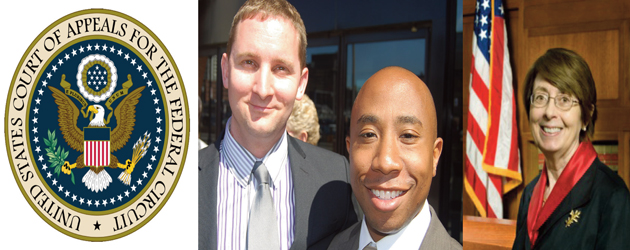
Gill et al v. Office of Personnel Management plaintiff couple Jonathan Knight (left) and Marlin Nabors outside the John Joseph Moakley Court House on the Boston waterfront, Wednesday, April 4, there for oral arguments in appellate court hearing. Unable to file jointly as a married couple for federal taxes, the Boston-based couple has lost thousands of dollars each year since they were married five years ago. Photo credit: Chuck Colbert
By: Lisa Keen & Chuck Colbert/Keen News Service–
The seventh-floor courtroom of the U. S. Court of Appeals for the First Circuit in Boston was packed to capacity. An overflow room equipped with closed circuit TV was provided for those not arriving early enough — shortly after 8 a.m. — for seating in the En Banc Hearing Room at the John Joseph Moakley U.S. Courthouse on the Boston waterfront.
The audience, most dressed in the dark business suits one normally associates with attorneys, was there to witness a historic event: The first argument against the Defense of Marriage Act (DOMA) in a federal appeals court. It was the case everybody knows is heading to the U.S. Supreme Court and, perhaps, for the history books, along with the 2003 Lawrence v. Texas which struck down laws against same-sex sexual relations.
Three of the four attorneys to argue that day were openly gay; and all three were arguing that DOMA should be struck down. The lone straight attorney before the bench would Paul Clement, a Republican legal celebrity, fresh off his high-profile challenge of President Obama’s Affordable Care Act before the U.S. Supreme Court the week before.
The gathering had to sit, first, through a one-hour argument in an unrelated case, and when it was done, at 10 a.m., Chief Judge Sandra Lynch announced a brief recess to allow attorneys for the next case to move into place.
Clement, bespectacled and dressed in a gray suit, sat on the far left side of the attorneys’ table, with one or two other associates.
To Clement’s right was openly gay attorney Stuart Delery, recently promoted at the U.S. Department of Justice to Acting Assistant Attorney General for the Civil Division—a step up after two years as senior counselor to Attorney General Eric Holder.
Legal gay icon Mary Bonauto of Gay & Lesbian Advocates & Defenders, the group which championed the historic case that led to same-sex marriages in the United States being legally recognized for the first-time ever, in Massachusetts, sat near the center, in a dark navy business pantsuit. Bonauto sported fashionable reading glasses.
Bonauto sat next to Paul Smith, the tall, red-headed openly gay attorney who argued and won the landmark 2003 U.S. Supreme Court decision, Lawrence v. Texas. Smith had served as cooperating counsel with GLAD for the plaintiffs in the case. Smith is also working on a similar lawsuit with GLAD in the federal district court of Connecticut.
To Smith’s right sat Maura Healey, an assistant attorney general for the Commonwealth of Massachusetts. Healey, like Bonauto, had argued against DOMA at the district court level, in the same courthouse on different days just 11 months earlier. And Healey had just been promoted, from chief of the Massachusetts Attorney General’s Civil Rights Division to chief of the AG’s Bureau of Public Protection and Advocacy, which oversees Civil Rights, Health Care, Antitrust, Environmental Protection, Consumer Protection, and Insurance and Financial Services.
To Healey’s right was her successor as chief of the state civil rights division, Jonathan Miller, whose wife gave birth to their first child just a few months ago.
On the bench were the First Circuit’s three most senior judges: 66-year-old Chief Judge Lynch in the center, 78-year-old Judge Juan Torruella, to the left, and 72-year-old Michael Boudin, to the right.
Reporters were not permitted to bring tape recorders, laptops, cell phones, or any other electronic devices inside the courtroom, and many were kvetching with mock horror that they would have to be relying on pen and paper to take notes for the historic event. Courtroom artist Jane F. Collins was employing her pastels and paper in a remarkably accurate rendering of the three justices and the backs of Clement and Healey for the New England Cable News channel.
Massachusetts Attorney General Martha Coakley was in the front row of the public section, behind Clement and in an animated discussion with people nearby. She was much in the news that day and the day before for indicting the former state treasurer on misuse of state resources. She would be back in front of microphones after this argument, explaining the state’s opposition to DOMA to the public. Also in the public section was former state Supreme Judicial Court Justice Judith Cowin. Cowin, generally seen as a conservative, voted with the majority in 2003, saying the state constitution guarantee same-sex couples the right to marry.
The one-hour argument was divided up: Clement and Delery would each get 20 minutes and Bonauto and Healey would each get 10.
A few minutes into Clement’s 20 minutes, a court staffer walked from the back of the courtroom up to the bench and spoke quietly with Chief Judge Lynch while Clement continued responding to a question from Torruella. Boudin leaned in and listened, too. It is quite rare for court staff to interrupt a judge hearing oral arguments. Lynch made no comment about the interruption during the rest of the proceeding, but it was apparently news that the court’s audio equipment was malfunctioning. The first 18 minutes of the one-hour argument were not recorded, the recording begins a few minutes into Delery’s presentation, and what was recorded was somewhat low quality.
Chief Judge Lynch had two questions for Delery and one question for each of the other attorneys; Torruella had about a dozen for Clement and half that for Delery; Boudin asked Clement and Delery a couple of questions each.
Of the three judges, Lynch has had the most experience with gay-related cases. In 2008, she penned a panel decision (Parker v. Hurley) that upheld a district court dismissal of a lawsuit by parents who sought to exempt their children from being in classrooms that discussed books that mentioned same-sex couples. Six months later, she became the first female Chief Justice of the circuit.
She asked Clement to expand upon his argument that it was perfectly rational for Congress to pass DOMA in order to wait for the consequences of recognizing same-sex marriages to “play out” first in the various states. She asked Delery whether DOJ’s argument that laws disfavoring gays should be held as legally suspect (and thus have to meet a more difficult judicial review) requires showing both that the laws express animus toward gays and that gays are targeted by the laws. And during a discussion of what cases DOJ was relying on to justify heightened scrutiny, Lynch interrupted Delery to ask, “Are you relying on Romer? Are you relying on Lawrence?”
Lawrence is the 2003 U.S. Supreme Court decision that struck down state laws banning same-sex sexual relations. Romer v. Evans is the 1996 U.S. Supreme Court decision that struck down a Colorado initiative that sought to bar laws prohibiting discrimination against gays.
When a very hoarse Bonauto argued that Congress jettisoned its historic neutrality around the definition of marriage when it passed DOMA in 1996, Lynch asked her to address Clement’s claim that the federal government did so because the Hawaii Supreme Court found, in January 1996, that its state constitutions required marriage equality.
And, finally, Lynch asked Healey to respond to Clement’s argument that Section 2 of DOMA “preserves the right of Massachusetts to define marriage as it chooses to do and ensures there will be full faith and credit, and that the question is whether the Massachusetts decision can drive the federal government’s decision about its benefits … sort of reverse the way you are articulating this.”
Section 2, which is not challenged by the litigation here, stipulates that no state shall be required to given legal recognition to “a relationship between persons of the same sex that is treated as a marriage under the laws of such other State….”
Outside the courthouse following the argument, reporters pressed Bonauto, Healey, Attorney General Coakley, and plaintiff couples.
Coakley voiced confidence in the “legal arguments” against DOMA and their “common sense emotional appeal” to “fairness.”
“This is about fairness, about what Massachusetts had already decided to good effect about families, keeping kids safe and giving kids opportunities,” she explained. “As the arguments made very clear, all this statute does is discriminate against same-sex couples and their children and everyone else in Massachusetts who decided this should be the law.” The federal government, she added, “has no business creating two sets of citizens, no good reason for it and plenty of illegal and unfair reasons. It’s time for it to go.”
Bonauto told reporters the lawsuit “is about equal treatment under the law and not singling out this one group of people to make them unequal to everyone else, which is what DOMA does.”
“For more than 200 years the federal government [has] accepted states’ definition of marriage and sometimes that has been controversial,” said Bonauto, reiterating the very point Lynch had zeroed in on. “Nonetheless, every single time a state marries somebody, it has been accepted for federal purposes. The one and only exception ever made from that equal rule was for same-sex couples.”
At a press availability following the argument, three sets of plaintiff couples spelled out details of how DOMA penalizes them in joint tax filing and social security spousal benefits.
Married for nearly eight years, Melba Abreu and Beatrice Hernandez cannot submit federal tax returns as married filing jointly. Between 2004 and 2008, Hernandez said, “DOMA has resulted in our paying more than $25,000 in excess federal taxes.”
Marlin Nabors and Jonathan Knight are similarly situated. Married for five years, the couple moved to Boston from the Midwest.
“We had no idea how getting married would impact our financial situation,” said Nabors, referring to the inability to file joint federal tax returns “Over the last couple of years, we have paid an additional $1,000, enough to make a difference.”
“In our day to day lives, we go about our business,” said Knight. “We live in a very accepting world here in Massachusetts and Boston, with employers, friends, and families. We don’t feel [the effect of DOMA] day to day, just once a year at tax time.”
For plaintiff couple Bette Jo Green and Jo Ann Whitehead, social security spousal benefits are at issue. Green and Whitefield are retired but DOMA prevents Whitehead from receiving the higher spousal payment under the standard formula that would result in higher payments to the lower earning spouse.
“I was a labor delivery nurse,” explained Green. “She was an educator.”
The couple said DOMA costs them $3,600 year. “It adds up,” said Whitehead. But, “beyond the financial issue,” said Whitehead, “is the fairness one.”








